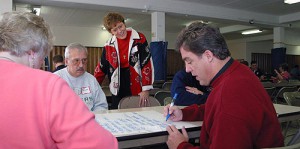PEP Newsletter
Ideas For Your Parish
_______________________________________________________________________ February, 2023
Origins
In preparation for the 50th Anniversary of the Parish Evaluation Project (PEP) on March 19, 2023, this Newsletter and the next will tell the story of its journey. PEP began with a presentation at the annual National Federation of Priests’ Councils (NFPC) Convention which took place at Detroit in mid-March of 1973. Having just completed graduate studies, I was invited to give a workshop to a group of 40 priests on how to gather information about the attitudes and desires of the parishioners. My hope was that once this information was provided, the pastors could plan ways to better serve their people.
After providing some of the results from my research and offering to do the same type of surveying in their parishes, the Office of Parishes in the Detroit Archdiocese decided to do a pilot project. A sample of six parishes from across the archdiocese were chosen to participate. Under my direction, the pastor and some of the staff and leaders from each parish met together on a Saturday in a church gym. The objective was to construct a survey instrument that would be given to a random sample of the parishioners in each parish. After tabulating the returns, I wrote a report of the findings for each parish, thinking that this information would be incorporated into the goal-setting process for the coming year. Wrong! The analysis I provided got relegated to a shelf somewhere and nothing more was done with it.
Expanding the Facilitation
Besides the frustration that the survey results were not acted upon, it also became clear that only one parish could go through this process at a given time. Each congregation had its own unique issues and concerns that needed individual attention. What was originally a nine month project soon grew into a two and a half year commitment that included six weekends involving the pastor, staff and leaders.
For the six sessions, the first two still dealt with surveying parishioners’ attitudes and preparing a report from which the leadership focused on concrete parish needs. The other four weekends concentrated on assisting the leadership not only in making plans based on the survey results, but on improving staff interaction, developing collaborative decision-making, creating new structures, establishing goals and action plans, and holding groups accountable. Because of these added components, it soon became clear that I needed to hire additional staff to direct this new planning model. By the middle 1980’s, the PEP staff had grown from one person to three. Besides myself, there was a person to manage the office and another to partner with me in preparing presentations and traveling to parishes located in various parts of the country.
Parish Assessment and Renewal (PAR)
In the late 1990’s, having visited over 160 parishes across the country, something was still missing. Working with parishes six weekends over two and a half years had a built-in flaw. While we were leading meetings in a parish, the participants became excited about what was being accomplished – attitudes were uncovered, staff interaction was improved, pastors stared sharing decisions with others. But in between our visits, the motivation of staff and leaders waned; their efforts slackened and the continuity was lost. Observing all this and searching for a solution, a new phase of PEP was born. Rather than visiting a parish six weekends over two and a half years, we decided to remain present in the parish for a longer period. There would still be a preliminary weekend for setting up a survey of attitudes and a follow-up weekend for digesting and responding to the results, but this was only the beginning of a much more thorough level of facilitation. This new phase was called PAR (Parish Assessment and Renewal) which will be described in next month’s PEP Newsletter.


